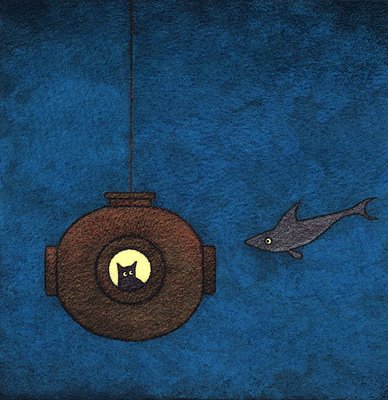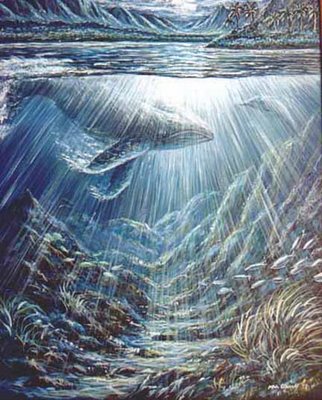Out and Down, Around and Ground

THE POEM AS CORACLE
AND DIVING BELL
June 27
There, there is nothing else
but grace and measure
Richness, quietness, and pleasure.
-- Baudelaire, “L’Invitation Du Voyage”
This crossing and descending
line both travels and rappels,
extending toward shores
& descending to bottoms
neither yet dreamed of in the
catalogue. I sail; I dive;
I keep the pulse alive
by finding surf-hallowed
ground at the same
time harrowing the
deeper leagues of what I find.
There are ports
which drift and dream
all night of shores
too far to reach, bobbing
all the boats tied there
with swells of sweetest
far-shore booty--
gold chapels, moon
castles, white
birds choralling God
on trees which take
up islands, steaming
plates of meat and
ardor laid out on tables
which no human
hands have cooked.
Also there are salt
Vaginas in the sound of
those far crash-
and booming waves,
the welcome of farewells,
an invitation to travel
down the deepest brines
of the heart, mines of
pure abyss darker and
wilder than any kiss
than I have known.
But will, this dark,
rain-sotted morning insists,
wafting lucent cleavage
in the next blue door
I find as the song gets
down under occluding
riven basics like I to
Thou and other glints
Of surficial seem.
Thus I peruse the ages
and carouse the beds,
dislodge gold psalters
from beneath the sleeping
head of a great blue
dragon circled round
the next island in the main,
a wild not found on
any chart on any ship
except the one inside
my dream. I voyage forth
to froth and foam
past all marges
to the sea god’s throne:
I dive deep along the
descending mile of
the iceberg, tracing
that god’s frozen bones
to where the poem’s
heel at last strikes
his own in the basalt
lingua of first things.
Such motions keep me
square on an unrelenting
thrash of ocean, level
between island and doom,
exceeding both coracle
and bell which tolls the
lees of hell.

From Navigatio sancti Brendani abbatis (“The Voyage of St. Brendan the Abbott”), transl. Denis O’Donoghue, 1893:
St Brendan then embarked, and they set sail towards the summer solstice. They had a fair wind, and therefore no labour, only to keep the sails properly set; but after twelve days the wind fell to a dead calm, and they had to labour at the oars until their strength was nearly exhausted. Then St Brendan would encourage and exhort them: ‘Fear not, brothers, for our God will be unto us a helper, a mariner, and a pilot; take in the oars and helm, keep the sails set, and may God do unto us, His servants and His little vessel, as He willeth.’. They took refreshment always in the evening, and sometimes a wind sprung up; but they knew not from what point it blew, nor in what direction they were sailing.
At the end of forty days, when all their provisions were spent, there appeared towards the north, an island very rocky and steep. When they drew near it, they saw its cliffs upright like a wall, and many streams of water rushing down into the sea from the summit of the island; but they could not discover a landing-place for the boat. Being sorely distressed with hunger and thirst, the brethren got some vessels in which to catch the water as it fell; but St Brendan cautioned them: ‘Brothers! do not a foolish thing; while God wills not to show us a landing-place, you would take this without His permission; but after three days the Lord Jesus Christ will show His servants a secure harbour and resting-place, where you ‘may refresh your wearied bodies.’
When they had sailed round the island for three days, they descried, on the third day, about the hour of none, a small cove, where the boat could enter; and St Brendan forthwith arose and blessed this landing-place, where the rocks stood on every side, of wonderful steepness like a wall. When all had disembarked and stood upon the beach, St Brendan directed them to remove nothing from the boat, and then there appeared a dog, approaching from a bye-path, who came to fawn upon the saint, as dogs are wont to fawn upon their masters. ‘Has not the Lord,’ said St Brendan, ‘sent us a goodly messenger; let us follow him;’ and the brethren followed the dog, until they came to a large mansion, in which they found a spacious hall, laid out with couches and seats, and water for washing their feet, ‘When they had taken some rest, St, Brendan warned them thus: ‘Beware lest Satan lead you into temptation, for I can see him urging one of the three monks, who followed after us from the monastery, to a wicked theft. Pray you for his soul, for his flesh is in Satan’s power.’
The mansion where they abode had its walls hung around with vessels made of various metals, with bridle--bits and horns inlaid with silver,
St Brendan ordered the serving brother to produce the meal which God had sent them; and without delay the table was laid with napkins, and with white loaves and fish for each brother, When all had been laid out, St Brendan blessed the repast and the brethren: ‘Let us give praise to the God of heaven, who provideth food for all His creatures.’ Then the brethren partook of the repast, giving thanks to the Lord, and took likewise drink, as much as they pleased. The meal. being finished, and the divine office discharged, St Brendan said: ‘Go to your rest now; here you see couches well dressed for each of you; and you need to rest those limbs over-wearied by your labours during our voyage. ‘
When the brethren had gone to sleep, St Brendan saw the demon, in the guise of alittle black boy, at his work, having in his hands a bridle-bit, and beckoning to the monk before mentioned: then he rose from his couch, and remained all night in prayer.
When morning came the brethren hastened to perform the divine offices, and wishing to take to their boat again, they found the table laid for their meal. as on the previous day; and so for three days and nights did God provide their repasts for His servants.

In the “The Honor and Glory of Whaling” chapter of Moby Dick, Melville transforms his lateral, linear sea-tale into something deeper, sinking his American gnostic gospel to its true end in the depths, as the Pequod will dive after Moby Dick at the story’s end.
“The more I dive into this matter of whaling,” he writes in the chapter, “and push my researches up to the very spring-head of it, so much the more am I impressed with its great honorableness and antiquity; and especially when I find so many great demi-gods and heroes, prophets of all sorts, who one way or other have shed distinction upon it.”
Melville then ranges through a variety of mythic whale-sized endeavors, from Perseus freeing Andromeda from Leviathan to Jonah spending three nights in a whale, Hercules battling his way out of one and St. George fighting the Dragon (offering that whales and dragons were often confused, and quotes Ezekiel: “Thou art as a lion of the waters, and as a dragon of the sea”).
Yet that is not enough: his greatest effort calls for an even more fundamental source. So he writes,
“Nor do heroes, saints, demigods and prophets alone compose the whole roll of our order. Our grand master is till to be named, for like royal kings of old times, we find the headwaters of our fraternity in nothing short of the great gods themselves. That wonderful oriental story is now rehearsed from Shaster, which gives us the dread Vishnoo, one of the three persons in the godhead of the Hindoos; gives us this divine Vishnoo himself for our Lord; — Vishnoo, who, by the first of his ten earthly incarnations, has for ever set apart and sanctified the whale.
“When Bramha, or the God of Gods, saith the Shaster, resolved to recreate the world after one of its periodic dissolutions, he gave birth to Vishnoo, to preside over the work; but the Vedas, or mystical books, whose perusal would seem to have been indispensible to Vishnoo before beginning the creation, and which must have contained something in the shape of practical hints to young architects, these Vedas were lying at the bottom of the waters; so Vishnoo became incarnate as a whale, and sending down to the uttermost depths, rescued the sacred volumes. Was not this Vishnoo a whalemen, then? ever as a man rides a horse is called a horseman?”

TWO DOOMS
June 28
I don’t know which deep-
sea image thralls me more:
The once-held notion
that ships & whales &
drowned men float
forever at the league
whose pressure finally
resists their falling weight;
or the later fact that
all things fall down the sea
until they lay at rest
at the bottom of it all.
As tropes go, each
unfurls bright sails
of welcome to the breeze,
lifting and crashing
the poem’s bow over a
wild blue wake startling
for what it travels toward
as reveals so far below.
In the first I see an
afterlife of angels in their zones,
hierarchons of salt abyss
stationed according to
their mass -- first the wide-eyed
men with arms still open
to the flinging of their souls;
then the halves of ships
with broken masts afloat
upon tides too dark for hearts
to see; and then, still further
down, the spiralling gavotte
of dead whales round the seas,
eternally at rest where
they once jawed squid
and spat their offspring
between a hell-dam’s knees.
In the second I read it takes
about three days to fall
all the way down deepest seas,
a nekyia like Christ’s three
days’ walk through Hell,
or St. Oran’s voyage to
Manannan’s north down
the well in which he was
buried in beneath the Iona
abbey’s footers. Three days
and nights to harrow down
the leagues of doom, to reach
at last the country of the
lost and tossed and damned,
a Sidhe-mound of spilled
doubloons and whale hips
and the teeth of dinosaur
divas not seen in seas for
three hundred million years.
It’s all there amid the
trash of a billion year
dreamtime falling, falling,
falling that way. How deep
is that infernal loam, I wonder,
across an acreage which
takes up three quarters of
this globe, a bricolage too
thick to read with all
sorts of endings sticking
out, a mast, a pocket
watch, the eyehole
of Manannan’s huge skull
like a door to mansions
further down?
To float -- or fall?
I’d hire ‘em both
to keel these lines
with the two darkest
lumbers in the sea,
ends which tantalize
the greenhorn pen
to leave behind dry chores
and seek those crashing shores
where all ships convoy out
beyond the metres of the known,
all eyes on deck riveted on
the dream of far adventure
with fear in its undertow,
repasting on the soul for dinner.
The great ships roll
proud and blowsy between
the awe and awfulness,
careering every wilderness
to find the greater shore,
even when it’s one or
three miles further down
from the softest beds
of island girls who
stain their lips with juice.
Two ends of falling
delight as they appall,
harrowing with depths
far wilder than the shores
of the farthest maidenhead
of all: and which, I wonder,
is the truest skipper of the dream:
the ever-drifting Yes of No
or the final failing scream?


<< Home